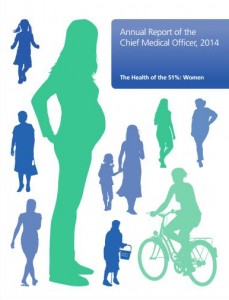11 December 2015 saw the publication of the Chief Medical Officer’s annual report on Women’s Health. The report “contains analysis of, and recommendations on, a range of women’s health issues, including obesity, cancer and reproductive health.” We were very pleased when we learnt that the CMO had focused her report on women’s health, and tackled head on some of the topics which are often shied away from in public, such as menopause and incontinence.
This report is of great interest to us. The main themes she looked at are:
- obesity and its impact on women’s health, including reproductive health
- women’s health in later life (menopause)
- women’s health in later life (pelvic floor dysfunction and incontinence)
 These are all topics which we focus on in our current Personal Training service, and in the coming months will also expand into the field of exercise and lifestyle for the 3rd Age woman (perimenopause and menopause phases). The CMO’s report is a whopping 162 pages long. Even though that’s a ridiculous amount of information, we’d recommend anyone working in this area or indeed if you are a woman, to have a look through the report. It’s organised into different topics per chapter so it’s easy to skip to the information you are interested in.
These are all topics which we focus on in our current Personal Training service, and in the coming months will also expand into the field of exercise and lifestyle for the 3rd Age woman (perimenopause and menopause phases). The CMO’s report is a whopping 162 pages long. Even though that’s a ridiculous amount of information, we’d recommend anyone working in this area or indeed if you are a woman, to have a look through the report. It’s organised into different topics per chapter so it’s easy to skip to the information you are interested in.
In her introduction, the CMO states “Women are often reluctant to seek help for conditions that are common, disabling and taboo, such as urinary and faecal incontinence and menopausal symptoms. Violence affects women in England’s physical and mental health on a scale which demands action across society. We must be able to talk about these issues so, in this report, I advocate increased awareness, dissemination of information and person-centred care in order to help women with hidden morbidity improve their quality of life.”
She also says “In women obesity can affect the outcomes of any pregnancies they have and impacts on the health of any future children they may have. In pregnant women, the developmental environment can affect the germline cells in the fetus e.g. their eggs (primary oocytes) and so a woman’s health whilst she is pregnant also impacts on the health of her children and grandchildren. This is a difficult message to convey, as it risks burdening women with guilt and onerous responsibility; I believe, however, that it can also empower women to take positive steps to healthy, stable nutrition and physical activity to benefit themselves and their families.”
As I read the report I pulled out over a dozen extracts (there could have been many more) from the report which all point towards women needing to listen to their bodies, take charge of their health and think about the long-term effects of daily decisions which are taken. Each chapter features a wealth of statistics and well researched topics, and based on the evidence provided the Chief Medical Officer summarises each topic and gives numerous recommendations for government and health departments in Chapter 1. The full report can be found here.
You don’t have to wait for those people to take on board the information and spend time debating what has been recommended. There is NO NEED for you to wait for others to make suggestions that could result in your life improving – YOU CAN TAKE CHARGE of your own well-being and health RIGHT NOW. If you’d like to make a change get in touch with Lynne to discuss how Personal Training could help you.





